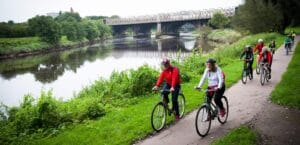Hundreds of miles of roads have been removed from the National Cycle Network (NCN) because they do not currently meet the standards set by Sustrans.
The cycling and walking charity that maintains the nationwide collection of bike routes, is also making a number of changes to help cyclists plan their routes more easily.
It says a total of 4.5% of the network, or around 753 miles of busy ‘on-road’ sections have now been taken of the NCN map, with no signage assigned, as they are falling short of the standards required and need further work. Some of the routes are not run wholly on the network and are maintained by highway authorities and other organisations.
A quarter of the routes will also have their status changed to warn riders they are only suitable for more experienced cyclists.
A total of 12,763 miles of the network is now mapped and promote to families and disabled people, people with long-term health issues and those who have just started cycling. Over 40.95%, 5,277 miles, of these routes are traffic-free paths.
Through its mapping system, Sustrans now also promotes information for on-road ‘named routes’ best suited for experienced cyclists. Some of these include the iconic Caledonia Way and Hadrian’s Cycle Route.
According to Sustrans, these changes are part of a long-term UK-wide plan for the National Cycle Network to double the miles of traffic-free routes from 5,000-10,000.
CEO of Sustrans, Xavier Brice, said: “The National Cycle Network is a vital part of the UK’s green infrastructure, connecting people to places and to one another, providing family-friendly spaces and boosting local economies.In times of public health crisis and climate crisis, travelling actively has never been more important.”
Redesigning the NCN follows at 2018 review, in which Sustrans found much of the route needed work.
The charity believes it will cost £2.8 billion to bring the network up to standard by 2040.
Mr Brice added: “The move to differentiate paths and routes will help us offer more targeted and relevant information on the paths for everyone choosing to walk, cycle and wheel.
“It’s also an opportunity to promote routes as leisure cycling destinations in their own right and build the UK’s cycle touring offer to both domestic and international audiences.”
Sustrans also pointed out the economic benefits of cycling, which contributes around £2.5 billion to local economies through leisure and tourism each year. Riders spent an estimated £10.3 million along the Caledonia Way in Scotland last year.

























